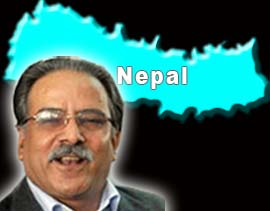Nepal Maoists announce protests as parties vie for power
 Kathmandu - A day after Prime Minister Pushpa Kamal Dahal resigned, bringing down his eight-month-old government in the climax of a power struggle with Nepal's president, the Maoists Tuesday announced a series of protests.
Kathmandu - A day after Prime Minister Pushpa Kamal Dahal resigned, bringing down his eight-month-old government in the climax of a power struggle with Nepal's president, the Maoists Tuesday announced a series of protests.
The Maoist protest announcement came as political parties led by the Nepali Congress and the Communist Party of Nepal - Unified Marxist Leninists (CPN-UML) prepared to told talks to form a new government.
On Tuesday morning, the Maoists accused President Ram Baran Yadav of overstepping his constitutional boundaries and demanded he apologize publicly for overruling a government decision.
Yadav, a member of the Nepali Congress party, on Sunday night ordered General Rupmangat Katuwal to remain as the head of the country's army, rejecting the Maoist government's decision to sack him several hours earlier.
"The president must appear before the constituent assembly and apologize for his unconstitutional and illegal step to quash the elected government's decision to remove the army chief," Maoist spokesman Dinanath Sharma said.
"We will disrupt session of the constituent assembly and organize peaceful street protests until the army chief is removed and the unconstitutional step is rectified," Sharma said.
There are real concerns that the Maoists could paralyse life across Nepal by organizing strikes.
Nepal's Home Ministry said it had deployed hundreds of extra police on the streets of Kathmandu to prevent violence.
Nepali Congress and CPN-UML, meanwhile, convened an all-party meeting to discuss the formation of a new government. The Maoists said they will not attend.
The president is also expected ask political parties to form a government of national consensus.
The political crisis that erupted over the Maoist-led government's attempts to remove army chief Rupmangat Katuwal is threatening the peace process.
Despite the crisis, the Maoists were not expected to resume their armed struggle, political analyst Kapil Shrestha said.
"Both the internal and international situation will not allow them to resume armed struggle and it will not be acceptable in Nepal as times have changed," Shrestha said.
The Maoists emerged as the single largest party in the constituent assembly but were well short of a majority in elections in April 2008.
The Maoist-led government replaced Katuwal with his second-in-command, General Kul Bahadur Khadka, despite strong opposition from coalition partners.
Relations between the army and the Maoist-led government have been strained since the army recruited nearly 3,000 new soldiers this year as the Maoists were seeing to integrate nearly 19,000 of their former guerrilla fighters into the national army.
Defence Minister Ram Bahadur Thapa, who is a senior Maoist politician, tried to block the recruitment, but the army went ahead after the Supreme Court ruled it was legal. (dpa)